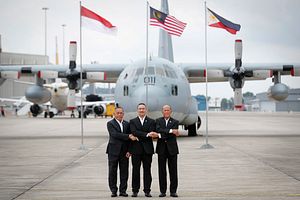This week, the Philippine Senate finally moved forward with approving a historic maritime boundary agreement between Indonesia and the Philippines. The move spotlighted the landmark 2014 pact between the two Southeast Asian states as well as some of the related areas that they are trying to make further inroads on within their broader relationship.
As I have noted before in these pages, among the most significant developments in contemporary Indonesia-Philippines security ties was the conclusion of a maritime boundary agreement in May 2014 that delimited the overlapping exclusive economic zones (EEZs) between the two countries. The legally-binding pact, which marked the conclusion of negotiations that began around two decades earlier, has since been highlighted as not only a positive development for bilateral ties, but also a potential model for Asian states looking to address such differences in line with international law, including the United Nations Convention on the Law of the Sea (UNCLOS).
Since then, both sides have been looking to move forward with formalizing and implementing the agreement reached, in spite of lingering challenges therein as well as opportunities in their wider defense relationship, such as the development of trilateral maritime patrols in the Sulu Sea along with Malaysia. One key step in this was the approval of the agreement by both legislatures; Indonesia’s parliament ratified it back in April 2017.
This week, the treaty was in the headlines again with the Philippine Senate approving it in what constituted another landmark step for its development. On June 3, the Senate voted unanimously to adopt Senate Resolution No. 1048, which officially indicates concurrence with the historic agreement.
Unsurprisingly, Philippine legislators framed the concurrence with the agreement in terms of the significance for the country’s interests. Senator Loren Legarda, chair of the Senate’s committee on foreign relations, said the agreement would play a significant role in providing additional clarity for law enforcement authorities in terms of recognizing where their jurisdictions lie and would also help protect the rights of Philippine vessels and fishermen.
The attention to the landmark 2014 agreement also highlighted some of the related issues both sides are working through. As an example, one of the issues highlighted by Legarda was the issue of how both sides can handle the issue of illegal fishing, with Indonesia adopting a tough approach to cracking down on the problem that has affected Jakarta’s ties with a number of other Southeast Asian states.
To be sure, the maritime boundary pact between Indonesia and the Philippines represents just one development in the wider relations between the two countries, and, as noted above, both sides still have work to do in terms of addressing the range of remaining challenges for the advancement of their bilateral relationship. Nonetheless, the future trajectory of steps such as the landmark agreement will be key to monitor as both sides continue to try to work through the issues that remain moving forward.
































